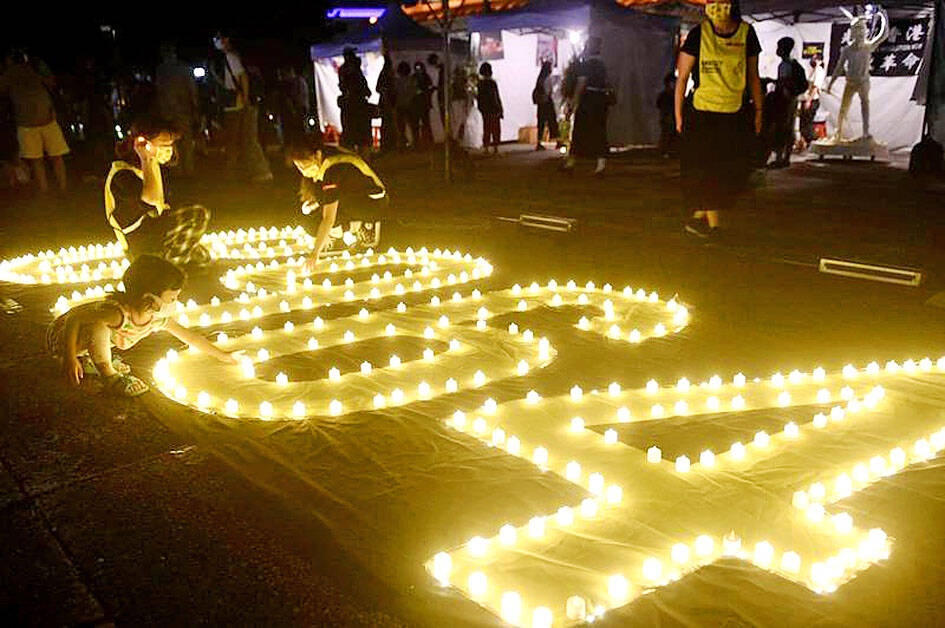Beijing should learn from the Tiananmen Square Massacre, and realize that brute force has severe consequences, the Mainland Affairs Council (MAC) said yesterday.
Beijing should renounce the use of coercive means against Taiwan and respect the insistence of Taiwanese on sovereignty and dignity to lessen the distance between autocracies and democracies, and foster mutual trust, the MAC said in a statement issued ahead of the 34th anniversary of the massacre in China.
On June 4, 1989, the Chinese government ordered its military into Tiananmen Square, Beijing, to forcibly end weeks of student-led demonstrations.

Photo: Chung Li-hua, Taipei Times
Estimated deaths from the crackdown vary from several hundred to several thousand, but China has never released an official death toll.
Beijing is still unable to “face its historical past” regarding the Tiananmen Square Massacre, the MAC said, urging it to face its “historical errors,” make public all records of the incident and enact reforms to safeguard the rights to free speech, religion and assembly.
Peace is the “only option” to resolve cross-strait issues, and maintaining the “status quo” is the greatest common denominator, as well as a shared responsibility for both sides of the Taiwan Strait, it said.
A MAC-commissioned poll released on Thursday showed that 84.2 percent of respondents in Taiwan supported President Tsai Ing-wen’s (蔡英文) stance on cross-strait affairs, including her statement that “it is the mutual responsibility of both sides of the Strait, as well as a global consensus that the Taiwan Strait problem be resolved peacefully.”
The poll showed that 91.7 percent of respondents were opposed to China’s military posturing, economic bullying and swaying Taiwanese diplomatic allies from Taiwan, while 90.4 percent were opposed to China’s efforts to divide Taiwan through its “united front” rhetoric.
As for the government’s gradual resumption of cross-strait ties, 84.2 percent of respondents were in support, and 87.2 percent agreed that the governments on both sides of the Strait should authorize negotiations between agencies before their borders are fully reopened to each other, the poll showed.
The poll showed that 85.3 percent of respondents supported stricter government regulations and the prevention of Chinese “united front” rhetoric, while 76.5 percent supported stepping up border controls for Chinese entering Taiwan.
The survey, conducted by Taiwan Real Survey Co on May 25 through Sunday last week, polled people aged 20 or older by telephone. It collected 1,077 valid samples, claiming a margin of error of 2.99 percentage points.

MAKING WAVES: China’s maritime militia could become a nontraditional threat in war, clogging up shipping lanes to prevent US or Japanese intervention, a report said About 1,900 Chinese ships flying flags of convenience and fishing vessels that participated in China’s military exercises around Taiwan last month and in January have been listed for monitoring, Coast Guard Administration (CGA) Deputy Director-General Hsieh Ching-chin (謝慶欽) said yesterday. Following amendments to the Commercial Port Act (商港法) and the Law of Ships (船舶法) last month, the CGA can designate possible berthing areas or deny ports of call for vessels suspected of loitering around areas where undersea cables can be accessed, Oceans Affairs Council Minister Kuan Bi-ling (管碧玲) said. The list of suspected ships, originally 300, had risen to about 1,900 as

DAREDEVIL: Honnold said it had always been a dream of his to climb Taipei 101, while a Netflix producer said the skyscraper was ‘a real icon of this country’ US climber Alex Honnold yesterday took on Taiwan’s tallest building, becoming the first person to scale Taipei 101 without a rope, harness or safety net. Hundreds of spectators gathered at the base of the 101-story skyscraper to watch Honnold, 40, embark on his daredevil feat, which was also broadcast live on Netflix. Dressed in a red T-shirt and yellow custom-made climbing shoes, Honnold swiftly moved up the southeast face of the glass and steel building. At one point, he stepped onto a platform midway up to wave down at fans and onlookers who were taking photos. People watching from inside

Japan’s strategic alliance with the US would collapse if Tokyo were to turn away from a conflict in Taiwan, Japanese Prime Minister Sanae Takaichi said yesterday, but distanced herself from previous comments that suggested a possible military response in such an event. Takaichi expressed her latest views on a nationally broadcast TV program late on Monday, where an opposition party leader criticized her for igniting tensions with China with the earlier remarks. Ties between Japan and China have sunk to the worst level in years after Takaichi said in November that a hypothetical Chinese attack on Taiwan could bring about a Japanese

The WHO ignored early COVID-19 warnings from Taiwan, US Deputy Secretary of Health and Human Services Jim O’Neill said on Friday, as part of justification for Washington withdrawing from the global health body. US Secretary of State Marco Rubio on Thursday said that the US was pulling out of the UN agency, as it failed to fulfill its responsibilities during the COVID-19 pandemic. The WHO “ignored early COVID warnings from Taiwan in 2019 by pretending Taiwan did not exist, O’Neill wrote on X on Friday, Taiwan time. “It ignored rigorous science and promoted lockdowns.” The US will “continue international coordination on infectious